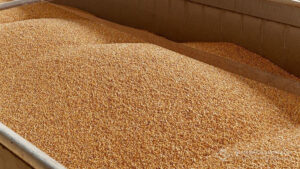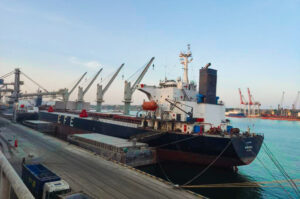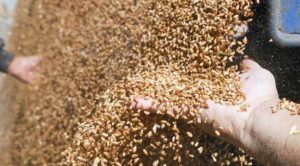
As of May 1, Ukraine exported 41.365 mln tonnes of grains and pulses since the beginning of 2023/24 marketing year, of which 6.314 mln tonnes were shipped in April, the press service of the Ministry of Agrarian Policy of Ukraine reported, citing the data of the State Customs Service.
According to the report, as of the same date last year, the total shipments amounted to 41.595 mln tons, including 3.619 mln tons in April.
In terms of crops, since the beginning of the current season, 15.778 million tons of wheat have been exported (in April, the figure was 1.936 million tons), 2.202 million tons of barley (231 thousand tons), 1.2 thousand tons of rye (0.2 thousand tons), 22.906 million tons of corn (4.136 million tons).
The total export of Ukrainian flour as of May 1 is significantly lower than last year’s figure (127.7 thousand tons) and is estimated at 86.6 thousand tons (7.4 thousand tons in April), including wheat – 81.9 thousand tons (6.8 thousand tons).
As reported, a number of sources in the Ukrainian market suggested that grain exports in April 2024 could be reduced to 5 million tons due to the constant shelling of port infrastructure by Russian troops, which made it difficult for a number of leading traders to supply agricultural products to foreign markets.

International grain trader Qortia AG (Switzerland) has resumed grain shipments from Ukraine’s deepwater ports, the company reported on Linkedin.
According to the report, the company sent the vessel Bereket M (Panama flag) with a cargo of 21.5 thousand tons of Ukrainian corn from Pivdennyi port to Turkey.
“Bereket M became the first vessel this year that Qortia AG loaded exclusively by its own resources in a deep-water Ukrainian port. Since the company’s establishment, we have been actively shipping to Ukraine from deep water for six years. However, after the Russian invasion, we focused mainly on the development of river transportation and transshipment in the ports of the Danube cluster, where the company’s share reached 15%,” the statement said.
Qortia AG is a Swiss agri-trading and logistics company headquartered in Switzerland. It specializes in the purchase and export of grains (wheat, corn, soybeans, barley, etc.), oilseeds, and processed products. The Ukrainian representative office is located in Odesa. Its owners are Konstantin Kuflyk, Dmitry Yandovsky, and Andrey Vitryak.
Bereket M is a bulk carrier flying the flag of Panama. Its length (LOA) is 154.38 meters and its beam is 26 meters.

Global grain production in 2023-2024 may be 1.3% higher than a year earlier and amount to 2.828 billion tons, taking into account the increase in production of corn, rice and wheat, FAO (the UN Food and Agriculture Organization) predicts.
According to its review, world grain reserves at the end of the current marketing year (MY) will amount to 894 million tons, which is 2.3% more than at the beginning of the year, indicating a ratio of world grain reserves to consumption of 31%.
The FAO also forecasts that the world grain trade in 2023/24 MY will increase by 1.7% compared to the previous season to 485 mln tonnes, mainly due to the increase in shipments of coarse grains, while the trade in wheat and rice is likely to decline.
In addition, the FAO revised its forecast for global wheat production in 2024 to 796 million tons, down from a month earlier, but still 1% higher than in 2023.
The forecast indicates that wheat production is expected to decline slightly in the European Union and the United Kingdom and Northern Ireland, where excessive humidity has led to a reduction in wheat crops. At the same time, localized drought is affecting the acreage in the southern and eastern parts of the European Union.
In the U.S., despite the reduction of plantings due to low prices, the total wheat production in the country will continue to grow in 2024 due to the expected increase in yields due to favorable weather conditions. In Canada, where spring wheat will be planted starting in May, experts expect a reduction in acreage due to lower profitability.
The conditions in Ukraine are assessed as unchanged from the previous month, as the war continues to put heavy pressure on the sector and production prospects.
In Russia, the wheat harvest in 2024 is forecast to be above average, although lower than last year.
In Asia, favorable weather conditions will boost grain production in India and Pakistan. A record wheat harvest is likely in 2024.
At the same time, a significant shortage of precipitation and hot temperatures across North Africa will lead to extremely low production in 2024 after the already poor results of last year.

“Kernel, one of Ukraine’s largest agricultural groups, has purchased a third vessel for grain exports with a carrying capacity of more than 50,000 tons, the agricultural holding’s press service reports on Facebook.
“We have purchased a new vessel Rotterdam Pearl V, capable of exporting more than 50 thousand tons of grain. Now our fleet already includes three vessels that can export about 100 thousand tons of grain and 20 thousand tons of sunflower oil per month,” the statement said.
The company added that it continues to invest in expanding maritime logistics capabilities for the Ukrainian agricultural industry.
“Our own fleet has been providing Ukrainian exports to the Mediterranean and North-East Atlantic countries for more than a year and allows us to manage costs along the entire logistics chain. The development of our own shipping, in particular, does not force us to fix tonnage from the market, which is unprofitable during the period of inflated freight rates during martial law,” the statement said.
Before the war, Kernel Agro Holding was the world’s leading producer of sunflower oil (about 7% of global production) and its exports (about 12%). It is one of the largest producers and sellers of bottled oil in Ukraine. In addition, it is engaged in the cultivation and sale of agricultural products.
Kernel’s net profit for FY2023 amounted to $299 million, while the company ended the previous year with a net loss of $41 million. The agricultural holding’s revenue for FY2023 decreased by 35% to $3.455 billion, but EBITDA increased 2.5 times to $544 million.

In 2023, Agrotrade agricultural holding exported grain to 13 countries, with Egypt and Tunisia being the largest buyers, the company’s press service reported on Facebook.
According to the report, Egypt, Tunisia, Turkey, and Spain were the largest buyers of grain from Agrotrade. Grain was also supplied to Italy, Vietnam, Greece, Hungary, Romania, Latvia, Cyprus, Bulgaria, and Austria.
“Last year, we worked mainly with our usual destination countries, except for Tunisia, to which we exported large batches of corn for the first time – almost 56 thsd tonnes. Thus, this country immediately took the second place in the structure of our foreign trade. In general, Egypt purchased the largest volumes of grain from the company – over 35 thsd tonnes of corn and over 25 thsd tonnes of soybeans. Traditionally, we supplied large volumes of agricultural products to Turkey and Spain. Our southern neighbors bought soybeans and corn, while the Spaniards bought wheat. The smallest volumes of goods went to Austria – 320 tons of soybeans,” said Andriy But, Director of the agroholding’s Foreign Economic Activity Department.
As reported, in 2023, Agrotrade supplied about 350 thsd tonnes of grain to the global market. The share of own agricultural products amounted to 35% or 116 thsd tonnes, and third-party producers – 65% or 230 thsd tonnes.
The Agrotrade Group is a vertically integrated holding company with a full agro-industrial cycle (production, processing, storage and trade of agricultural products). It cultivates over 70 thousand hectares of land in Chernihiv, Sumy, Poltava and Kharkiv regions. Its main crops are sunflower, corn, winter wheat, soybeans and rapeseed. It has its own network of elevators with a simultaneous storage capacity of 570 thousand tons.
The group also produces hybrid seeds of corn and sunflower, barley, and winter wheat. In 2014, a seed plant with a capacity of 20 thousand tons of seeds per year was built on the basis of Kolos seed farm (Kharkiv region). In 2018, Agrotrade launched its own brand Agroseeds on the market.
Vsevolod Kozhemiako is the founder and CEO of Agrotrade.

Ukraine has exported 34.862 million tons of grain and leguminous crops since the beginning of the 2023/24 marketing year and as of April 1, of which 5.192 million tons were shipped in March, Deputy Minister of Agrarian Policy and Food of Ukraine for Digital Development, Digital Transformation and Digitalization Denis Bashlyk said in Telegram.
According to the report, in terms of crops, 18.765 million tons of corn, 13.842 million tons of wheat, 1.962 million tons of barley, and 1,000 tons of rye have been exported since the beginning of the current season.
The total export of Ukrainian flour since the beginning of the season as of April 1 is estimated at 79.3 thousand tons, including wheat flour – 75.1 thousand tons.